KATHMANDU: Aman Pratap Adhikari has etched his name as a prominent figure in Nepali television, with shows like Himalayan Roadies, Who Wants to Become a Millionaire?, and Aina to his credit.
Aman embarked on his television journey in 1998 at Nepal Television and is currently engaged in the production and broadcasting of the second season of ‘The Poet Idol.’
This program holds special significance for him as it is a tribute to his father, the renowned writer Kshetra Pratap Adhikari.
Born and raised in Kathmandu, Aman’s entry into television was an unexpected turn from his initial pursuits as a football player.
His television career found its roots in his participation in World Cup football, a connection that remains close to his heart.
Two particular television moments stand out for Aman. The first, at the age of 24, he was featured live on a foreign channel while providing commentary for a SAFF Game.
The question posed by his father, Kshetra Pratap, during that time, remains etched in his memory.
Aman’s love for football led him to play javelin throw, long jump, high jump, volleyball, and baseball in school, but his special passion remained with football.
Secondly, directing the first season of Himalayan Roadies holds a special place in his heart, marking a significant milestone in his career.
Childhood Sports Enthusiasm
Aman, born and raised in the Old Baneshwar of Kathmandu in the year 2030 BS, enjoyed a privileged childhood without facing significant hardships. As the youngest son, he was shielded from the struggles that his parents might have faced.
His childhood was filled with cherished memories, including swimming in the Bagmati River, playing marbles during winter holidays, and engaging in childhood mischief, among others.
Reflecting on his childhood, Aman shares, “I was very shy.” He recounts an amusing incident where they went to the Pashupati forest to throw stones at monkeys.
One unforgettable moment from Aman’s childhood involved collecting money from friends to repair a deflated football and playing in the barren fields of Baneshwar.
Although he attended St. Xavier’s School, Aman confesses that he wasn’t particularly interested in studies.
He adds, “I never failed, but I was always the first one to rush to the ground when the bell rang. Teachers used to commend his incredible passion for the game.”
Club Football at 16
Aman’s love for football led him to play javelin throw, long jump, high jump, volleyball, and baseball in school, but his special passion remained with football.
Spending a decade playing in the A Division League, he recalls being forced to switch from goalkeeper to forward after breaking his arm.
Aman’s journey in club football started at 16 when he joined Friends Club, influenced by coach Indraman.
Despite a modest monthly salary of 500, Aman embraced the opportunity and began his dedicated football career.
Cycling to Football Practice
Even with an old rented bicycle, Aman’s commitment to football led him to purchase a ‘mountain bike’ after completing SLC.
Aman shares, “At that time, a bicycle was like a hero’s ride,” describing the pride he felt cycling to football practice at Friends Club.
Delhi Journey for Football and Studies
Facing a drop in game performance due to a leg injury at 16, Aman decided to study in India at Delhi University on a ‘Football Scholarship.’
To secure the role, Aman underwent a commentary test in front of the then Managing Director of TV, Durganath Sharma, including tests in Nepali and English language proficiency.
Despite playing in the A Division, Aman’s growing age and physical weakness made him reconsider his football career.
However, he successfully combined studies and football during his three-year stint in Delhi.
Television and Football Connection
Football continued to influence Aman’s life as he entered the television industry.
His World Cup experience in 1998 led to a role at Nepal Television, contributing to pre-World Cup highlight programs.
With no internet access at the time, Aman meticulously studied games by taking notes, laying the foundation for his career in television.
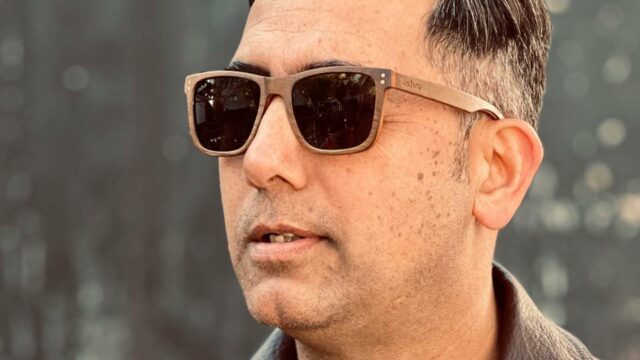
Recalling his early days in television, Aman emphasizes, “Television became good for me because I have a record of all sports.”
Despite receiving a salary of Rs 3,800 from his initial television program, Aman has not forgotten the valuable experience that shaped his career.
An Opportunity to Work in Television
Following his contribution to the pre-World Cup highlights, Aman took on the role of Assistant Producer in the sports program broadcasted by Nepal Television.
This program, hosted by Binod Kharel, stood as the sole sports-related program in Nepal, paving the way for new opportunities.
Simultaneously, during the 8th SAFF Games held in Nepal in 1999, Aman transitioned from research to commentary, seizing the chance due to his connection with Binod Kharel, a national team member.
However, proving his capability for commentary on the country’s only television proved to be a challenging endeavor for Aman.
The commentary and hosting duties for SAFF were previously handled by Binod Kharel.
In the eighth season, Kharel was unavailable as he served as the national team’s goalkeeper.
Aman shares that he departed from the popular program ‘Scoreboard’ to pursue studies in the UK after learning about India’s advancements in big production and multi-camera direction.
Aman recalls the situation, stating, “There was talk of bringing people from India,” and he proposed on television that he would step in.
To secure the role, Aman underwent a commentary test in front of the then Managing Director of TV, Durganath Sharma, including tests in Nepali and English language proficiency.
The memory of Durganath’s reaction during the commentary test still lingers. Interrupting Aman, Durganath assured him, saying, “Don’t worry, we are not hiring people from India. Now you do the commentary.”
The Joy of Commentary
Aman vividly recalls the challenges he faced in gathering information about the teams participating in SAFF due to the absence of internet access.
He shares, “I used to go where the teams were sitting, visiting some teams up to seven times. I would even go to hotels to meet teams, promising to speak positively about them to the coach.”
The experience of providing commentary in Nepali until the semi-final and in English during the semi-final and final remains unforgettable for Aman.
He proudly notes, “I was 24 years old at that time. While watching TV at home, an Indian channel showed a replay of the game with my voice commentary, reaching other countries including India.”
Despite the joy brought by his commentary replay on an Indian channel, Aman remembers his father’s perspective.
While friends applauded Aman’s success, his father questioned, ‘The commentary is good, what job will you do now?’
Considering his role as a commentator during SAFF an essential career opportunity, Aman continued to explore various facets of television.
Transitioning from a researcher, he became a presenter, marking his debut on the program ‘Khel Khel.’
Aman left Nepal Television after a rejected proposal for sportscasters to teach sports news and joined Kantipur TV.
His proficiency in English led him to read the evening news, showcasing his versatility in the television industry.
Despite one and a half months of rigorous work, the satisfaction derived from the moment the show aired was immensely gratifying for him.
Aman shares that he departed from the popular program ‘Scoreboard’ to pursue studies in the UK after learning about India’s advancements in big production and multi-camera direction.
Reflecting on this decision, he explains, “The scoreboard had reached 75. I thought that multi-camera direction reached India, and now Nepal will also go. I thought that I should study for that.”
Opportunity to Be a Presenter
Aman, initially entering television as a researcher, expanded his role to become a presenter.
His debut as a presenter was on the program “Khel Khel,” where he formed lasting connections with fellow colleagues.
Despite leaving Nepal Television due to rejected proposals, Aman found a new home at Kantipur Television, where he utilized his proficiency in English to read the evening news.
Leaving the popular program ‘Scoreboard’ behind, Aman pursued studies in the UK upon learning about India’s advancements in big production and multi-camera direction.
His decision to study abroad reflected his foresight into the evolving landscape of television production.
Again, the Struggle in Kathmandu
Returning to Nepal from Britain in 2010, Aman joined Aman Terai Television as an Executive Producer.
He took pride in conceptualizing ‘The Flop Show,’ a program hosted by comedian Sandeep Chhetri, suggesting the name “Flop Show” during its inception.
Aman claims to be the initial creator of the program “What the Flop,” asserting his role in its development.
Subsequently, Aman, assuming the roles of presenter and director, led the daring program ‘Venturing Nepal’ and directed the musical program ‘Kripa Unplugged.’
Describing his journey, Aman emphasizes that ‘Venturing Nepal’ showcased his versatility beyond sports, while ‘Kripa Unplugged’ demonstrated his ability to diversify program genres after his overseas studies.
Don Director
Following his directorial role in Himalaya Roadies, Aman earned the moniker ‘Don Director.’ His unique journey to bring the franchise of the program to Nepal reflects his relentless determination.
Aman vividly recalls the unforgettable responsibility assigned by Himalayan TV management for two days, emphasizing, “The management went to Mumbai.”
During that week in Mumbai with the crew, he envisioned how to adapt the program for Nepal, and the blueprint crafted in those two days gained the confidence of the Indian side.
Aman attributes his success in this venture to the experience gained through studying abroad.
“I presented in Mumbai, showcasing that the shoot would span from Jomsom to Terai,” he adds.
Aman recalls presenting amidst a gathering of around 150 Indian directors, each eagerly waiting for their turn.
Despite facing skepticism from television and advertisers questioning the appeal of poetry, Aman remained steadfast in his belief that ‘The Poet Idol,’ envisioned by him, was on par with programs brought through franchise acquisitions.
Following the guidelines provided by the Indian side, he considers leading a team of 127 people to successfully produce the first season of Roadies a special milestone in his career.
Aman views the first season of Roadies as a pivotal success in his career.
Who wants to Become a Millionaire?
After a year and a half of preparation, Aman received a call from the management to helm “Who Wants to Become a Millionaire?”
Despite one and a half months of rigorous work, the satisfaction derived from the moment the show aired was immensely gratifying for him.
He emphasizes, “It’s a franchise show, and adherence to the standards set by foreigners is crucial. Lighting and sound must align, and my overseas education played a significant role. Nepal’s set was even ranked among the top 15 globally. The program, on hold for a year and a half, aired within a month and a half of my involvement.”
Reflecting on the challenging preparations for the show’s first episode, Aman recalls the hard work required to convince the British team.
He recounts the visit of a stern Vice Chairman from the UK, who, despite initial frustrations, eventually showed some positivity due to his connection with Aman’s teacher from the UK.
The trial shot adhered to audience-competition program rules, taking 5-6 hours to produce a single episode.
Aman remembers the foreign team’s reaction after the trial episode filming, sharing that they cornered him to express, “This trial episode will be broadcast as the first episode. It took a while, but now it won’t take as long; we trust you.”
The Poet Idol
Following his involvement with Who Wants To Become A Millionnaire, Aman found a special connection with ‘Aina,’ despite his initial interest in participating in foreign franchise programs. Aina, impressed by Congress leader Bishwaprakash Sharma’s knowledge and personality, left a lasting impact on Aman.
Aman recalls Sailesh Kandel Chhetri’s idea to create a reality show about poetry from the program’s inception.
He shares, “Sailesh suggested creating something for poetry to honor my father’s memory, and that’s how the program’s concept was born.”
Reflecting on this experience, he shares, “My last commentary was on NLL after 2003. It was a special moment for me, and the enjoyment was palpable. Many viewers may not be aware that I had done commentary before.”
Despite facing skepticism from television and advertisers questioning the appeal of poetry, Aman remained steadfast in his belief that ‘The Poet Idol,’ envisioned by him, was on par with programs brought through franchise acquisitions.
During the lockdown, Sailesh’s blueprint for the reality show became a reality, and Aman made it a point to change the name to The Poet Idol to resonate with a broader audience.
After five years of meticulous planning and investing his own resources, Aman successfully brought the program to fruition.
The second season of The Poet Idol has now premiered, and Aman notes a positive response from the market this year.
Commentary after 23 Years
While football remains Aman’s first love, his current success is deeply intertwined with the sport.
Television viewers in Nepal were introduced to the original reality show The Poet Idol due to Aman’s foray into television prompted by football.
Another unforgettable moment for Aman was returning to commentary after 20 years during the Nepal Super League.
Reflecting on this experience, he shares, “My last commentary was on NLL after 2003. It was a special moment for me, and the enjoyment was palpable. Many viewers may not be aware that I had done commentary before.”


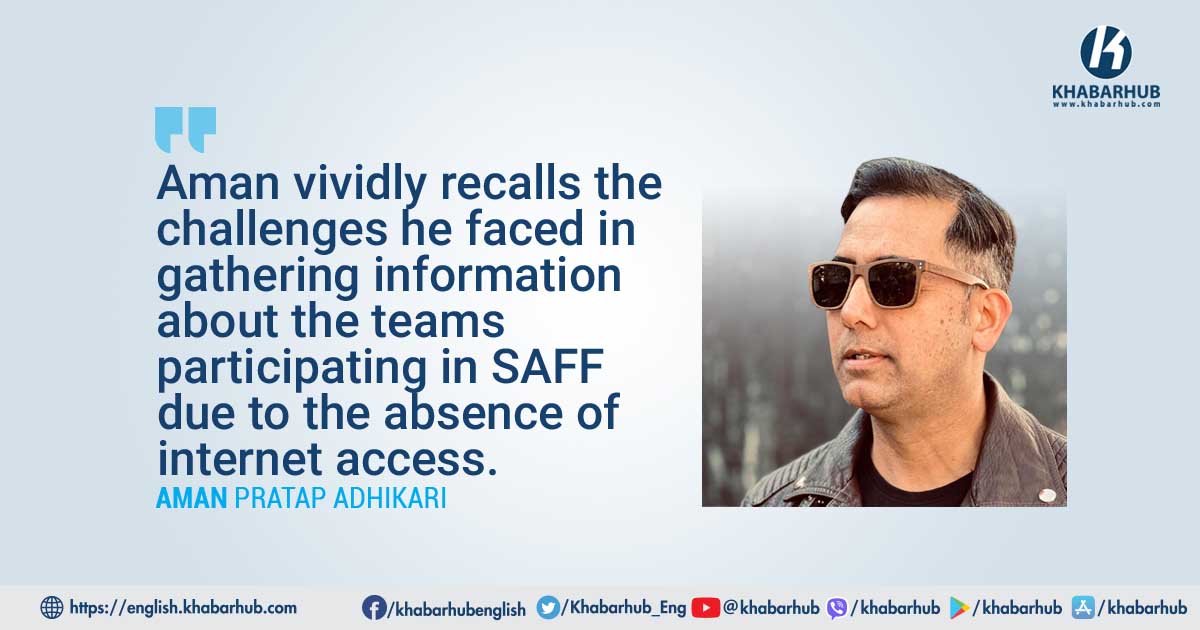
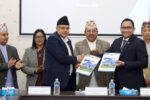

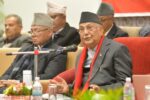

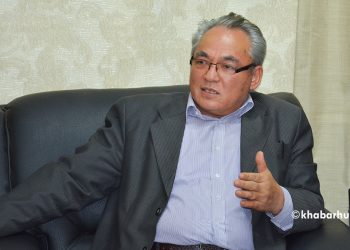

Comment